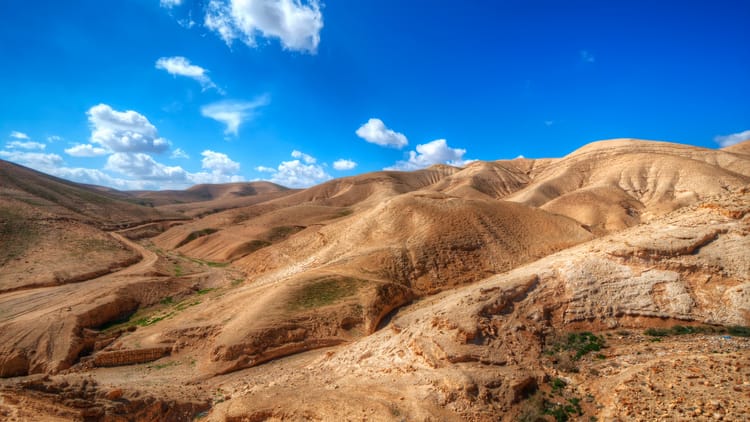When People Oppose You (Psalm 56)

Big Idea: When people oppose you, remember that God is greater and cares for you, and then give thanks to him.
Psalm 56:4 asks an interesting question: “What can flesh do to me?”
The answer is, actually, a lot. Take this psalm, for instance. It was written by David, and people were doing a lot to make his life miserable. Verses 5 and 6 say:
All day long they injure my cause;
all their thoughts are against me for evil.
They stir up strife, they lurk;
they watch my steps,
as they have waited for my life.
What can flesh do to me? David answers with a list of things:
- They can twist your words
- They can plot and conspire against you
- They can lurk and wait for a chance to pounce and destroy
The list of things that people can do to you is almost endless.
Some of the biggest problems we will ever face come from what other people can do to us. At some point, you will be hurt by others. Someone will take something you said or did out of context and misrepresent you. Someone will decide they don’t like you and make life difficult for you. Someone at some point will spread lies about you. Someone will try to sabotage you, and it will hurt.
I’m not saying this will happen all the time. But it will probably happen sometime in your life, and it will hurt, and you will have to figure out what to do.
The Problem
The inscription to Psalm 56 gives a description of one time that David faced this problem:
TO THE CHOIRMASTER: ACCORDING TO THE DOVE ON FAR-OFF TEREBINTHS. A MIKTAM OF DAVID, WHEN THE PHILISTINES SEIZED HIM IN GATH.
In 1 Samuel 21:10-14, David was on the run from Saul, the king of Israel who wanted to kill him. David was so desperate to get away that he escaped to the land of his enemies, the Philistines. The Philistine king wasn't very smart, so it seemed like David would escape unpunished. However, the king's officials reminded him that David had killed Philistines.
And here we get an idea of how David felt in this situation. We read in 1 Samuel 21:12: “And David took these words to heart and was much afraid of Achish the king of Gath.” David took these words seriously. He knew his life was in danger. Understandably, he felt afraid. Terrified.
This led him to cry out to God for help:
Be gracious to me, O God, for man tramples on me;
all day long an attacker oppresses me;
my enemies trample on me all day long,
for many attack me proudly.
(Psalm 56:1-2)
David is in a tough situation. At home, he’s being pursued by Saul, who wants to kill him. He hasn’t yet built up the group of followers who will help him later. It was soon after this that David collected a group of 400 men around him who were in distress, in debt, and bitter in soul (1 Samuel 22:2). At this point, he didn’t even have that. He was completely alone and in enemy territory with people who were attacking him.
What could flesh do to him? A lot. They could continue to alert the king to the danger that David posed. They could continue to trample on him, oppress him, and attack him. They could injure his cause, think evil thoughts, stir up strife, and look for an opportunity to pounce. As David writes this psalm, he’s overwhelmed, opposed, alone, and afraid.
Again, I hope that you aren’t going through this. But I know that it can happen. Sometimes, for reasons we can’t completely understand, someone turns against us. They gossip about us. They might try to harm us. They spread false information. We try to reconcile, but they’re just not interested.
This doesn’t have to happen a lot. If it happens even once, you will understand how painful it is. When people turn against you, it causes great pain.
What David Does
What does David do in this psalm? He reminds himself of two truths and then takes one action. There are two truths that can help us when we experience the deep relational pain of people who wish us harm, and then there is one action we should take.
Two Truths
Here are the two truths.
First: God is bigger than our enemies.
Look at what David says in verses 3-4:
When I am afraid,
I put my trust in you.
In God, whose word I praise,
in God I trust; I shall not be afraid.
What can flesh do to me?
Again, read words that are very similar in verses 10 and 11:
In God, whose word I praise,
in the LORD, whose word I praise,
in God I trust; I shall not be afraid.
What can man do to me?
Here’s the first truth: God is bigger than our enemies, and we can trust him and his word.
Even when we’re in great danger, we can put our trust in God. You can put your trust in his character.
When people turn against us, we may start to see them as bigger than they really are, and we might lose sight of the greatness of God. The people are so far out of proportion that we begin to see them and the threat they pose as even bigger than God.
Think about how crazy this is. Ed Welch describes the problem: sometimes we allow people to become big and God to become small.
1. We fear people because they can expose and humiliate us.
2. We fear people because they can reject, ridicule, or despise us.
3. We fear people because they can attack, oppress, or threaten us.
These three reasons have one thing in common: they see people as “bigger” (that is, more powerful and significant) than God, and, out of the fear that creates in us, we give other people the power and right to tell us what to feel, think, and do.
The only way to deal with this problem is to rightsize people. How do we make sure we're not seeing people as bigger than they really are? By seeing God as he really is. When we lose sight of God, fear of others intensifies. But when we fear God, we no longer have to fear what others can do to us. As Welch puts it, “The person who fears God will fear nothing else.” David begins to look at God and fear him, which leads him to say, “What can flesh do to me?”
What’s the solution to fearing what others can do to us? Fearing God more. Grasp that God is on his throne. He is not worried about our enemies. If you belong to Jesus, he is with you. Nothing can touch you or harm you. Everything that happens to you is within his control. You never have to question even for a minute whether God is in control or if he cares. He is very much in control, and he cares for everything you go through. Look at him in his glory, and the threat that any mere human poses to you will begin to fade into the background. You can trust him even when people turn against you.
Let me show you what David did. Three times, in verses 4 and 10, he says that he praises God’s word. What does this mean? It could be that David is recounting to himself the Scriptures. As he mediates on God’s word, he begins to be filed with a fresh vision of God. Scripture fills him with courage as he sees God for who he is, and David’s enemies begin to shrink in size. That could be what it means.
In times of trouble, we too can draw assurance from God’s word that will allow us to see God properly. As we see God, our problems will get rightsized, and we will be able to say with David, “What can flesh do to me?”
There's another option. David could be talking about what happened in 1 Samuel 16, when Samuel anointed him as king. The words that Samuel spoke must have seemed a long way off as David hid in a cave in enemy territory. But he believed that God’s promises were true, even as he waited years to see their fulfillment.
But here’s what he knew: God is bigger than our enemies, and we can trust him. We serve a God who has never reneged on a single one of his promises. Even better: we serve a God who sent his Son himself to suffer at the hand of enemies so he could save us. Jesus demonstrated what it’s like to trust God when he was betrayed for you and for me. When Jesus suffered, he feared God more than his enemies, and because he did, all who trust him can be saved. Like Jesus, we can discover that God is bigger than our enemies, and we can trust him and his word. That is the first truth.
But here’s the second truth that can help us when we experience the deep pain of people who wish us harm.
Second: God takes notice of our sufferings and tears.
You have kept count of my tossings;
put my tears in your bottle.
Are they not in your book?
(Psalm 56:8)
David was alone in enemy territory. This was not a great time in David’s life. But he found comfort in the truth that God knew what he was going through.
I love verse 8. What would have been written down back then? Not a lot compared to now. Kings would keep a record of significant events that occurred during their reign. In verse 8, David says that God keeps a record of David’s wanderings and his miseries. As he cries, David’s tears are so precious to God that God collects them in a bottle and preserves them.
“God will never forget nor ever be indifferent to the cares of any one of his much-beloved people” (James Montgomery Boice). As another person (Christopher Ash) says, “Our heavenly Father will catch every one before ever it reaches the ground. He treasures the sorrows of Christ’s people, every one, as he treasured every tear of Christ on earth. Not one will be lost; not one will fail in its divine purpose.”
God is very aware of what you’re going through. He takes particular notice. Your sufferings and your tears matter very much to him.
David faced the deep pain of people who wished him harm. But then he reminded himself that God was bigger. Not only that, but he reminded himself that God took notice of his sufferings and his tears.
One Action
And then David took one action:
I am obligated by vows to you, God;
I will make my thanksgiving sacrifices to you.
For you rescued me from death,
even my feet from stumbling,
to walk before God in the light of life.
(Psalm 56:12-13)
In the last two verses, David anticipates his deliverance by God. He vows to make a thanksgiving sacrifice. The purpose of this sacrifice was to give thanks to God for His blessings and deliverance. Part of the sacrifice would be burnt on the altar; part would be given to the priest; part would be eaten by the person who brought the offering, along with others as they celebrated God’s goodness.
As David remembers what’s true about God, he determines that he will present a thanksgiving offering to thank God for delivering him. Thanksgiving and fellowship characterize those who trust in God even in the face of real danger.
What can flesh do to you? A lot. You can be really hurt by the actions of others who don’t care for you one bit and who want to bring you down.
But then you can remind yourself: God is bigger than they are. You can trust God and his word. He cares for you. He takes particular notice of your sufferings and tears. Just as the Father delivered Jesus from his enemies, he too will deliver you as you continue to trust in him.
And so you can determine right now to offer your thanks to God for caring so well for you. You can determine to do this even in the middle of your problems.
When people oppose you, know that God is greater and cares for you, and then give thanks to him.
And as you do so, you can take the end of verse 9 to heart: “This I know: God is for me.” If you are in Jesus, he is for you! “He did not even spare his own Son but gave him up for us all. How will he not also with him grant us everything?” (Romans 8:32).





